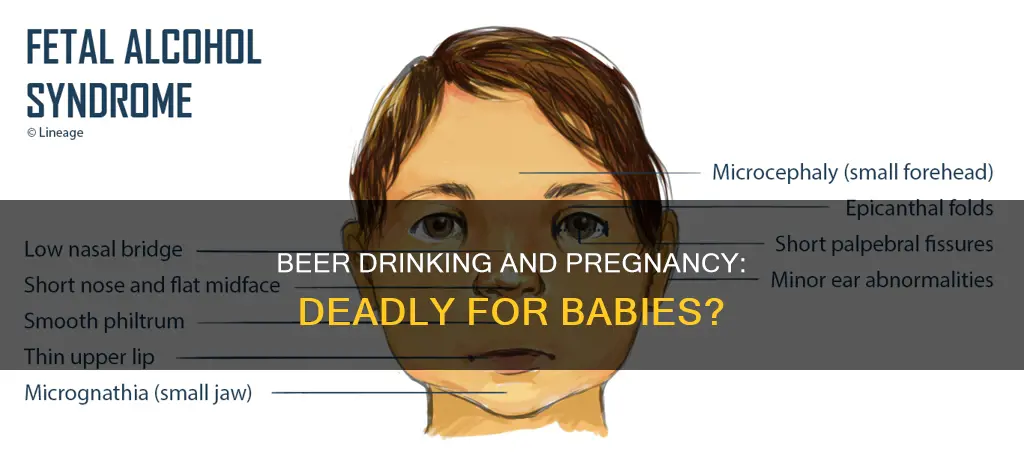
Drinking alcohol during pregnancy can have serious consequences for the baby, including long-term harm, an increased risk of miscarriage, premature birth, and low birth weight. Alcohol passes through the placenta to the baby, who does not have a fully developed liver and cannot process it. This can lead to a condition called fetal alcohol spectrum disorder (FASD), which causes problems with learning, behaviour, joints, bones, muscles, organs, managing emotions, and developing social skills. The more the mother drinks, the greater the risk to the baby.
| Characteristics | Values |
|---|---|
| Effects on the baby | Brain damage, musculoskeletal damage, growth retardation, physical birth defects, changes in brain development, intellectual disability, behavioural problems, low birth weight, miscarriage, preterm delivery |
| Cause | Alcohol passes from the mother's blood through the placenta to the baby |
| Preventative measures | It is recommended that pregnant women or those planning to become pregnant should not drink alcohol |
What You'll Learn

Miscarriage and stillbirth
Drinking alcohol during pregnancy can have severe adverse effects on the baby, and there is no known safe amount or time to consume alcohol while pregnant. Alcohol use during pregnancy increases the risk of miscarriage, stillbirth, and sudden infant death syndrome (SIDS).
Miscarriage is a fetal loss that occurs before 20 weeks of gestation. Alcohol consumption during pregnancy, especially in the first trimester, can cause structural damage to the fetus, including facial abnormalities, small skull circumference, and problems with the baby's internal organs, musculoskeletal system, and central nervous system. The brain is particularly vulnerable to the effects of alcohol, as it develops throughout pregnancy. Alcohol can kill neural stem cells, leading to behavioural and learning deficits in the child.
Research has shown that drinking four or more drinks per week during pregnancy is associated with an increased risk of miscarriage. One study found that women who drank four or more drinks per week were 2.65 times more likely to have a miscarriage than those who abstained. The risk of early fetal loss ( <10 weeks gestation) was also elevated for this group, with an adjusted hazard ratio of 2.79. However, the magnitude of the effect was lower for late fetal loss (10-20 weeks gestation), and the results were not statistically significant.
Another study found a significant association between drinking spirits two or more times per week and miscarriage, while the association between drinking beer and miscarriage was weaker. Women who drank only spirits had a significantly increased risk of miscarriage, with an adjusted hazard ratio of 2.24. The risk of early fetal loss was also elevated for this group, with an adjusted hazard ratio of 2.50.
In conclusion, alcohol consumption during pregnancy, especially heavy drinking and drinking spirits, is associated with an increased risk of miscarriage. The risk of miscarriage is highest in the first trimester when the baby's organs are forming, and the effects of alcohol can cause structural and neurological damage. It is recommended that pregnant women or those planning to become pregnant should avoid alcohol consumption to minimise any risks to the baby.
Beer Buddy: How It Works and Why It's Awesome
You may want to see also

Low birth weight
Drinking beer during pregnancy can have many adverse effects on the baby, including low birth weight. While the exact amount of alcohol that can cause problems is unclear, it is best for women to avoid alcohol if they are pregnant or planning to become pregnant.
Prenatal alcohol exposure can also cause brain damage, resulting in behavioural and learning deficits. Alcohol kills neural stem cells, reducing neurogenesis and leading to neuronal abnormalities. These abnormalities can manifest as cognitive and behavioural issues, including learning disabilities, attention problems, hyperactivity, and poor coordination.
Fetal Alcohol Syndrome (FAS) is a group of disabilities caused by alcohol consumption during pregnancy. Babies with FAS are often born prematurely and underweight, with characteristic facial features such as a thin upper lip and small eye openings. They may also have a small head, short nose, and problems with the formation of the heart or joints.
The effects of FAS can persist throughout life, and children with FAS often experience vision and hearing issues, developmental delays, and difficulty socialising. They are also more likely to struggle in school and may require assistance for medical and behavioural issues throughout their lives.
To prevent these potential complications, it is recommended that women abstain from drinking alcohol during pregnancy. While occasional drinking may not cause harm, there is no known safe threshold for alcohol intake during pregnancy. Complete abstinence is the best way to eliminate any risk of fetal alcohol spectrum disorder and ensure the healthiest outcome for both mother and baby.
Mixing Beer and Tylenol: Is it Safe?
You may want to see also

Brain damage
Drinking beer during pregnancy can have detrimental effects on the developing foetus, and can even result in lifelong brain damage. Alcohol is known to slow down the development of the foetus's brain and cause brain damage, even if consumed in small amounts.
When a pregnant woman consumes alcohol, it passes through her blood and into the baby's blood, tissues, and organs. Alcohol takes a much longer time to break down in the baby's body than in an adult's body. This means that the baby's blood alcohol level remains high for longer than the mother's. As a result, the baby is at risk of harm, and can even suffer from lifelong damage.
The Alcohol Pharmacology Education Partnership states that alcohol exposure during pregnancy can cause brain damage and cognitive and behavioural problems. This is because alcohol kills neural stem cells, reducing neurogenesis. This can lead to neuronal abnormalities, resulting in behavioural and learning deficits. These effects can occur even without any physical abnormalities, such as facial abnormalities or small skull circumference.
Heavy drinking during pregnancy can lead to fetal alcohol syndrome (FAS), which includes symptoms such as behavioural and attention problems, changes in the shape of the face, poor growth, poor muscle tone, and problems with movement, balance, thinking, and speech. These medical problems can range from mild to severe and can persist throughout the child's life.
While the potential effects of light and moderate drinking are not as clear, it is still recommended that pregnant women avoid consuming any alcohol. Some studies have suggested that light drinking during pregnancy may not harm the baby, but there is no definitive proof that any amount of alcohol is safe. The CDC, the U.S. Surgeon General, the American College of Obstetricians and Gynecologists, and the American Academy of Pediatrics all advise pregnant women to abstain from alcohol completely.
Beer Drinking: Throat Damage and Health Risks
You may want to see also

Physical deformities
Drinking beer or any other alcoholic beverage during pregnancy can lead to physical deformities in the baby. Alcohol consumed during pregnancy can cause a wide variety of effects on the foetus, ranging from brain damage to musculoskeletal damage and growth retardation.
The majority of structural development takes place during the first trimester (the first twelve weeks of pregnancy). During this time, the musculoskeletal system is formed, along with the internal organ systems (the endocrine system, respiratory tract, digestive tract, and nervous system). Prenatal alcohol exposure during this critical period can cause damage to specific cell populations, crucial for organ formation. Some of the most common physical defects include facial abnormalities, small skull circumference, and skeletal and muscle problems.
Facial abnormalities are a characteristic feature of fetal alcohol syndrome (FAS). Babies with FAS are often born prematurely and are underweight. They may have a thin upper lip, small eye openings, and a flattened philtrum (the small vertical groove between the upper lip and the nose). Other physical signs of FAS include a small head and a short nose.
In addition to the physical deformities mentioned above, drinking during pregnancy can also cause problems with the way the heart or joints are formed. Children with FAS may also experience poor coordination and have difficulty with problem-solving and relating to their peers. These physical and developmental issues can make school a challenging time for children with FAS.
While the effects of light drinking are not well understood, it is recommended that pregnant women avoid alcohol completely to minimise any potential risks to their unborn child.
The Art of Beer: A Guide to Flavorless Sipping
You may want to see also

Behavioural and learning problems
Drinking beer or any other alcoholic beverage during pregnancy can have adverse effects on the child's behavioural and learning abilities. Alcohol can easily cross the placenta and reach the developing baby, affecting their brain development. This can lead to behavioural problems such as poor judgement, not understanding the consequences of their actions, and trouble with social relationships. These issues can create lifelong challenges for the child and their families.
The consumption of alcohol during pregnancy can also cause fetal alcohol spectrum disorder (FASD), which includes a range of effects on brain development. Children with FASD may experience learning problems and behavioural issues. The most severe form of FASD is fetal alcohol syndrome (FAS), which can result in significant challenges in learning and behaviour, along with specific facial features and smaller head and body size.
Alcohol exposure during pregnancy, especially during the first trimester, can cause damage to neural stem cells, reducing neurogenesis. This can lead to neuronal abnormalities and increase the risk of behavioural and learning deficits in the child. Even drinking during the second and third trimesters can produce children with severe cognitive and behavioural problems, without any physical abnormalities.
It is recommended that pregnant women or those planning to become pregnant should avoid alcohol completely to minimise any risks to the baby.
Shingles Shot: Beer Drinking and Safety Concerns
You may want to see also
Frequently asked questions
No, it is not recommended to drink any amount of alcohol at any time during pregnancy or when trying to conceive. Alcohol can affect the pregnancy even before a person knows they are pregnant.
Drinking during pregnancy increases the risk of miscarriage, premature birth, and low birth weight. It can also lead to long-term harm to the baby, such as fetal alcohol spectrum disorder (FASD), which can cause problems with learning, behaviour, joints, bones, muscles, and organs.
If you have drunk beer while pregnant, it is recommended to stop drinking as soon as possible. The baby will still benefit from no longer being exposed to alcohol. However, if you are struggling to stop drinking, it is important to seek help from a healthcare professional or support organisations.
Alcohol passes from the mother's blood through the placenta to the baby and can seriously affect its development. The baby's liver is not fully developed and cannot process alcohol.
It is generally recommended to avoid all types of alcoholic beverages during pregnancy, including beer, wine, and spirits. However, some sources suggest that a single serving of alcohol on a rare occasion is less likely to cause harm to the baby but should still be avoided.







